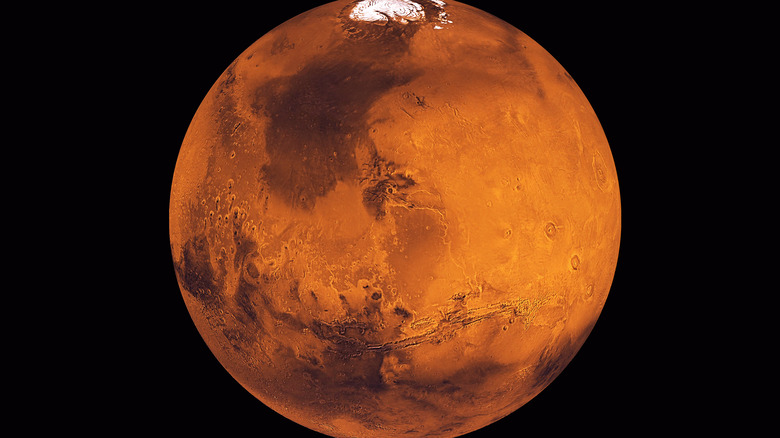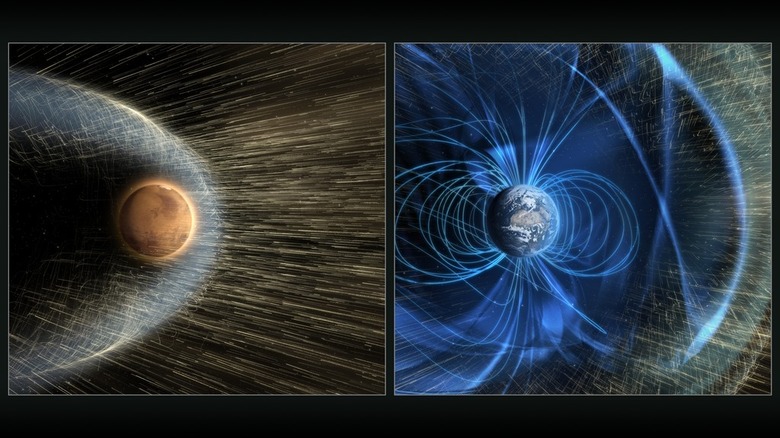Here's What Happened To The Thick Atmosphere Mars Once Had
As CNBC reports, Elon Musk wants to send humans to Mars — initially to explore, but ultimately to colonize the planet for good. That sounds like an exciting step, but plenty of roadblocks stand in the way of a permanent human settlement on Mars; perhaps none are as worrying as Mars' ultra-thin atmosphere. Per Space.com, Mars' current atmosphere is 100 times thinner than that of Earth, and mostly carbon dioxide to Earth's nitrogen and oxygen. This, of course, means that humans can't breathe on Mars, but it also means that Mars lacks the protective shielding that a thick atmosphere provides against radiation. Thus, Mars' thin atmosphere makes the planet pretty inhospitable to human tourists.
But Mars' atmosphere wasn't always how it is today. As Universe Today points out, Earth's inner planets have a diverse range of atmospheres: Mercury's is almost nonexistent, Venus' is ultra-thick, and Earth's is relatively thick. Mars' atmosphere is certainly on the thinner side, but the gullies and canyons across the Martian surface indicate that Mars once had flowing waterways. And if Mars had liquid water, scientists realized, it must have had a thicker atmosphere. So what happened to it?
To study Mars' atmosphere and its history, NASA launched the Mars Atmosphere and Volatile EvolutioN (MAVEN) spacecraft in 2013. After a few years of data collection using MAVEN, NASA's researchers were able to determine the most likely culprit for Mars' thinning atmosphere: the Sun.
Mars' once-thick atmosphere was likely pushed into space by solar winds
As these researchers report, the Sun's ultraviolet radiation and "solar winds" (streams of charged particles) likely stripped away Mars' atmosphere over a many-million-year period. As these charged particles from the Sun crashed into the gas particles in Mars' atmosphere, these collisions sent some of those gas particles flying upward into space — too fast for Mars' gravity to pull them back down. This process is known as "sputtering." NASA's researchers focused their attention on the noble gas argon, but they were able to conclude that most other gases in Mars' formerly-thick atmosphere were also stripped away by sputtering.
But this raises another question: why has "sputtering" affected Mars, but not Earth? For that, Universe Today reports, we should thank Earth's global magnetic field, which has deflected the bulk of the Sun's solar winds away from Earth, thereby protecting our atmosphere. As Universe Today explains, Earth's magnetic field is a result of our planet's liquid outer core rotating around its solid inner core, creating a dynamo effect. Mars, too, is believed to have had a magnetic field like this, but it disappeared when the planet's outer core cooled and became solid.
Not long after Mars lost its magnetic field, the planet's atmosphere began to be stripped away into space by the Sun. Thus, unless we can restart Mars' magnetic field, any terraforming efforts — attempts to make Mars habitable by giving it an Earth-like atmosphere — are likely to be unsuccessful.

